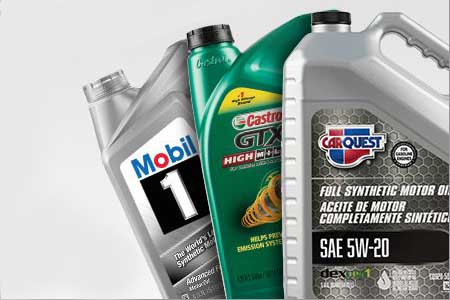As the lubricant for the moving parts of your engine, oil is widely considered to be the most important fluid you can use. It prevents excessive engine wear and tear, which makes it vital to keep your car running. So it's important to understand the different types of engine oil available and how to choose the best one for your vehicle, budget, and needs.
Regular, synthetic, and blend
There are three main types of oil: conventional/regular, synthetic and synthetic blend. Conventional oil is organic — it’s essentially refined crude oil that’s been pumped up from the ground. Synthetic oil is manufactured molecule by molecule, and because of that, synthetics have fewer imperfections in their chemical buildup than conventional does. Synthetic blends, or "semi-synthetics," add synthetic additives to conventional oil and can be a nice compromise between the two. They're less expensive, but provide some of the performance enhancement you get from a synthetic.
And...synthetic wins?
In general, synthetic oil outperforms regular oil on all counts:
- Synthetic oil works better in extreme temperatures from below freezing to above 100' F. Regular oil is highly reactive to temperatures.
- Because synthetics have superior lubrication (they’re more slippery) and create less sludge, they give you better fuel economy, performance and even a longer engine life.
- And best of all, synthetics don’t have to be changed as often. But make sure you meet warranty service mileage intervals regardless.
The only downside to synthetic oil is it costs more than the regular stuff — typically twice as much. That's a big difference. But before you choose pennies over performance, crunch the numbers. With longer oil change intervals, the price difference might be a wash. However, if you don’t drive your car hard and/or in extreme conditions, and if you don’t tow heavy loads or supercharge your engine, and if you change your oil promptly on schedule, the price increase to switch from regular oil to synthetic may not be worth it to you.
Keep in mind...
These three types of motor oil will work fine in your vehicle as long as they meet current American Petroleum Institute (API) certification and don’t go against the manufacturer’s recommendations. The only type of engine you should never use synthetic oil in is a rotary. Rotary engines have unique seals that are engineered for use with conventional oil only.
Check that you’re not voiding your warranty by using the wrong oil. Many newer vehicles require that you use synthetic oil, and some synthetics aren’t approved for certain diesel engines.
The final say for Conventional Oil
When buying oil for your car, the best thing you can do is to follow your manufacturer's recommendations. So, check that owner’s manual! When you consider that the wrong oil can cause an engine to fail, it pays to take their suggestions seriously. If you have the option to choose between synthetic and conventional and still aren’t sure which to pick, try a synthetic blend. Still unsure? Consult a pro.
So where do you fall in the synthetic vs. conventional debate? Leave us a comment.








